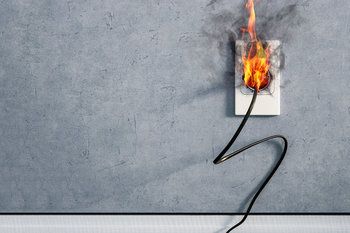 Can you really borrow your investment property down payment? Are borrowed funds an acceptable source for a rental property down payment?
Can you really borrow your investment property down payment? Are borrowed funds an acceptable source for a rental property down payment?
The answer is "no." Except when it's "yes."
While most mortgage programs don't allow you to borrow a down payment, some forms of down payment financing are allowed under certain programs.
Home equity loan can be down payment for rental property
For conforming mortgages (Fannie Mae and Freddie Mac), home equity loans are acceptable sources for a down payment. That's because a home equity loan is secured by an asset -- your home, vacation property or other rental.
Fannie Mae's guidelines read, "Borrowed funds secured by an asset are an acceptable source of funds for the down payment, closing costs, and reserves, since borrowed funds secured by an asset represent a return of equity."
You can even borrow the entire down payment, allowing you to purchase rental property with nothing down.
Related: Buying a home as an investment property
How much do you need for an investment property down payment?
Some mortgage programs, including Fannie Mae and Freddie Mac loans, allow a 15% down payment for rental property. However, you'd then have to secure approval from a mortgage insurer and pay for mortgage insurance. At least one national insurer requires a minimum 700 FICO score to approve mortgage insurance for an investment property.
Most applicants may have better luck with a 20% or 25% down payment. And that may even save you money.
Suppose that you can borrow 15% of a $200,000 home's purchase price with a home equity loan at a 6% interest rate. And if your FICO is 700, your mortgage insurance premium is .72%. If your mortgage rate is 5.25%, your total principal and interest is $1,196 per month. But borrowing a 20% down payment and avoiding mortgage insurance drops your monthly payment to $1,124.
Assuming a home purchase price of $200,000:
| Down payment |
15% | 20% |
| 1st Mortgage | $ 170,000 | $ 160,000 |
| 2nd Mortgage | $ 30,000 | $ 40,000 |
| 1st Payment | $ 939 | $ 884 |
| 2nd Payment | $ 180 | $ 240 |
| Mortgage Ins. | $ 77 | $ 0 |
| Total per month: |
$ 1,196 | $ 1,124 |
It's cheaper to finance a larger down payment with the second mortgage because adding mortgage insurance to your first mortgage takes the interest rate up to nearly 6% in this case.
So putting at least 20% down has a few advantages. You have a better chance of being approved for a mortgage, and your monthly costs are likely to be lower.
Related: How to Get a Mortgage for Investment Property
How does a home equity loan for your down payment work?
Fannie Mae and Freddie Mac allow you to take a home equity loan to finance an investment property down payment. You need to document the terms of the home equity loan when you apply for your investment property mortgage.
When you buy a rental property, you know what you're spending and what your down payment is. So the most appropriate home equity loan choice is likely to be a fixed-rate installment product with unchanging payments. Those loans are safer and make budgeting easier.
However, there are times when you might prefer a home equity line of credit (HELOC). If you're going to renovate the property before renting it out, and you're doing the work in stages, a HELOC might be smart. That's because you can borrow and pay interest only for the money that you need, when you need it. HELOCs are also cheaper to set up, so they can be a good choice for smaller amounts.
Related: Tips for Buying Distressed Properties
How do you borrow a down payment for investment property?
Fannie Mae's guidelines say that the lender must document the following:
- The terms of the secured loan,
- Evidence that the party providing the secured loan is not a party to the sale
- Evidence that the funds have been transferred to the borrower
What this means is that you must provide the loan documents specifying the amount borrowed, the payment, term and interest rate.
To make sure that you're approved for the investment property mortgage before taking out the home equity loan, you can apply for credit approval assuming certain terms for the second mortgage. Then you'll provide the loan documents when you are under contract and complete the home equity loan process.
The lender financing your investment property, in accordance with federal law, verifies that the home equity loan doesn't come from anyone who will gain from the property sale, like the seller or real estate agent. And before you can close on your investment property, you must show that the money is in your possession.
Most of the time, you'll have your loan proceeds wired to your title company or real estate attorney, and they can fax the proof to your lender, which then funds the investment property mortgage so you can close.
The payment for the home equity loan counts in your debt-to-income ratio, so include it when you're evaluating the property's investment income potential.
Related: Investing in Real Estate Now
Borrowing a down payment with other secured loans
You may be able to finance your investment property down payment with loans secured by assets other than your home. Fannie Mae says, "Assets that may be used to secure funds include automobiles, artwork, collectibles, real estate, or financial assets, such as savings accounts, certificates of deposit, stocks, bonds, and 401(k) accounts."
When you borrow against physical assets, the installment payment counts in your debt-to-income ratio.
However, if you borrow against a financial asset -- like stocks or your 401(k) balance -- the payment, if required, doesn't count in your ratios. Because, for all practical purposes, you're borrowing from yourself.
Related: 8 Costs to Consider When Buying Rental Property
Borrowing the down payment with unsecured loans
There is another way to borrow your down payment, using credit cards or a personal loan. If you plan for your investment property purchase in advance, you may take out an unsecured loan and deposit the proceeds into your bank account. After several months, it mingles with your other funds and is viewed as part of your savings.
Plan on keeping the money in your account for at least three months before applying for an investment property mortgage. And understand that if your current balance is much higher than your average balance, or if the bank statements you supply show a single large deposit, you'll probably have to explain it, and that could affect your mortgage approval.
Understand that these methods are more expensive and come with higher payments than home equity financing.
Related: Preparing to Buy a Home: Saving for Your Down Payment
The bottom line on financing your down payment
When financing investment real estate, costs matter. What you pay for financing affects your return on investment. You don't want to just buy low and sell high; you also need to finance as cheaply as possible to maximize your return on investment (ROI).
The best way to do this is to compare quotes from several competing lenders for each of your loans -- the home equity and the investment property mortgage. Then choose the least costly combination of loans.
Check out mortgage rates in your state.



